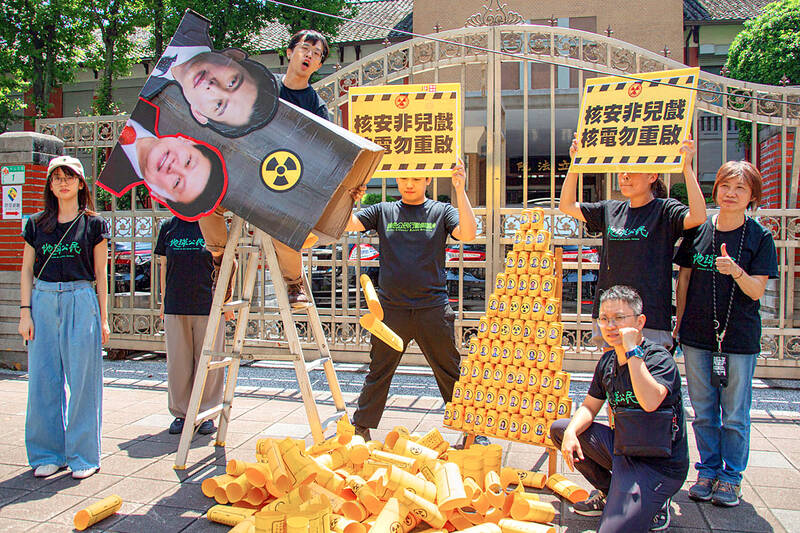The legislature yesterday passed an amendment to extend the operating license of nuclear reactors, potentially pushing back the implementation of Taiwan’s “nuclear-free homeland” policy by another two decades.
The No. 2 reactor of the Ma-anshan Nuclear Power Plant in Pingtung County is set to shut down on Saturday, realizing the Democratic Progressive Party’s (DPP) goal of eliminating all nuclear power from the nation’s energy mix.
Article 6 of the Nuclear Reactor Facilities Regulation Act (核子反應器設施管制法) stipulates that operating licenses are valid for 40 years and cannot be extended without an application for renewal.

Photo courtesy of the National Nuclear Abolition Action Platform
The competent authority must inspect the reactor and ensure it is safe for continued operation before authorizing a new operating permit, allowing the operator to continue operations.
The amendment raises the cap to 60 years.
Chinese Nationalist Party (KMT) and Taiwan People’s Party (TPP) lawmakers yesterday voted 60 to 51 DPP votes to pass the third and final reading of the amendment.
Minister of Economic Affairs J.W. Kuo (郭智輝) last week said that if the reactor is approved for continued operation, the nation would have to obtain new fuel rods, which would take at least 16 to 18 months.
Executive Yuan spokeswoman Michelle Lee (李慧芝) said that the amendment was unrelated to removing the fuel rods from the second reactor at the Ma-anshan Nuclear Power Plant.
There is no plan to assess the power plant’s continued operations, as the nation should place the safety of the public first, Lee said.
Should the operator file for continued operations, the request would be assessed and based on national safety standards, she said.
DPP caucus chief executive Rosalia Wu (吳思瑤) said that the continued use of nuclear power is a serious issue and should not be politicized.
Public consensus, how to guarantee nuclear power security and how to dispose of nuclear waste are the three preconditions that the DPP has set before the use nuclear power can be discussed, Wu said.
Seeking to extend a plant’s lifespan without such considerations places national security at risk, she said.
KMT caucus whip Fu Kun-chi (傅?萁) said that the amendment’s passage is a step toward stable power provision nationwide.
Other nations are also restarting their nuclear power plants, he said, adding that the plant must continue operations after appropriate safety checks.
TPP deputy caucus convener Chang Chi-kai (張啟楷) said that the amendment was proposed at least eight years ago, but the DPP consistently blocked discussion of the issue.
The opposition parties have removed the legal obstacle, Chang said, adding that rising power prices, increased air pollution and threats to national security due to power shortages would be on the DPP’s head.

CHAOS: Iranians took to the streets playing celebratory music after reports of Khamenei’s death on Saturday, while mourners also gathered in Tehran yesterday Iranian Supreme Leader Ayatollah Ali Khamenei was killed in a major attack on Iran launched by Israel and the US, throwing the future of the Islamic republic into doubt and raising the risk of regional instability. Iranian state television and the state-run IRNA news agency announced the 86-year-old’s death early yesterday. US President Donald Trump said it gave Iranians their “greatest chance” to “take back” their country. The announcements came after a joint US and Israeli aerial bombardment that targeted Iranian military and governmental sites. Trump said the “heavy and pinpoint bombing” would continue through the week or as long

TRUST: The KMT said it respected the US’ timing and considerations, and hoped it would continue to honor its commitments to helping Taiwan bolster its defenses and deterrence US President Donald Trump is delaying a multibillion-dollar arms sale to Taiwan to ensure his visit to Beijing is successful, a New York Times report said. The weapons sales package has stalled in the US Department of State, the report said, citing US officials it did not identify. The White House has told agencies not to push forward ahead of Trump’s meeting with Chinese President Xi Jinping (習近平), it said. The two last month held a phone call to discuss trade and geopolitical flashpoints ahead of the summit. Xi raised the Taiwan issue and urged the US to handle arms sales to

BIG SPENDERS: Foreign investors bought the most Taiwan equities since 2005, signaling confidence that an AI boom would continue to benefit chipmakers Taiwan Semiconductor Manufacturing Co’s (TSMC, 台積電) market capitalization swelled to US$2 trillion for the first time following a 4.25 percent rally in its American depositary receipts (ADR) overnight, putting the world’s biggest contract chipmaker sixth on the list of the world’s biggest companies by market capitalization, just behind Amazon.com Inc. The site CompaniesMarketcap.com ranked TSMC ahead of Saudi Aramco and Meta Platforms Inc. The Taiwanese company’s ADRs on Tuesday surged to US$385.75 on the New York Stock Exchange, as strong demand for artificial intelligence (AI) applications led to chip supply constraints and boost revenue growth to record-breaking levels. Each TSMC ADR represents

Pro-democracy media tycoon Jimmy Lai’s (黎智英) fraud conviction and prison sentence were yesterday overturned by a Hong Kong court, in a surprise legal decision that comes soon after Lai was jailed for 20 years on a separate national security charge. Judges Jeremy Poon (潘兆初), Anthea Pang (彭寶琴) and Derek Pang (彭偉昌) said in the judgement that they allowed the appeal from Lai, and another defendant in the case, to proceed, as a lower court judge had “erred.” “The Court of Appeal gave them leave to appeal against their conviction, allowed their appeals, quashed the convictions and set aside the sentences,” the judges